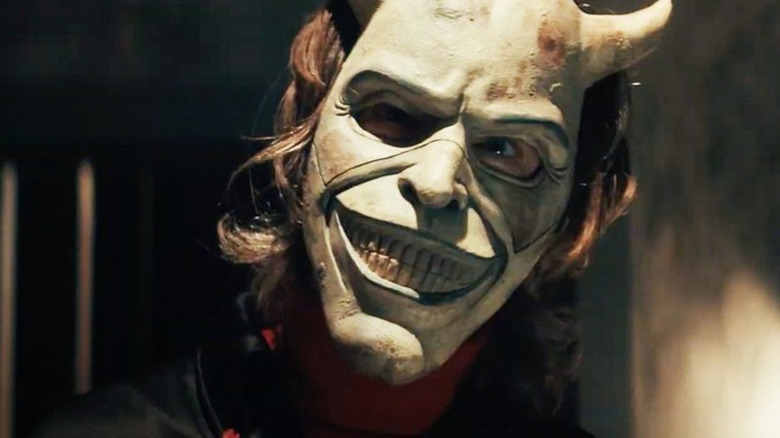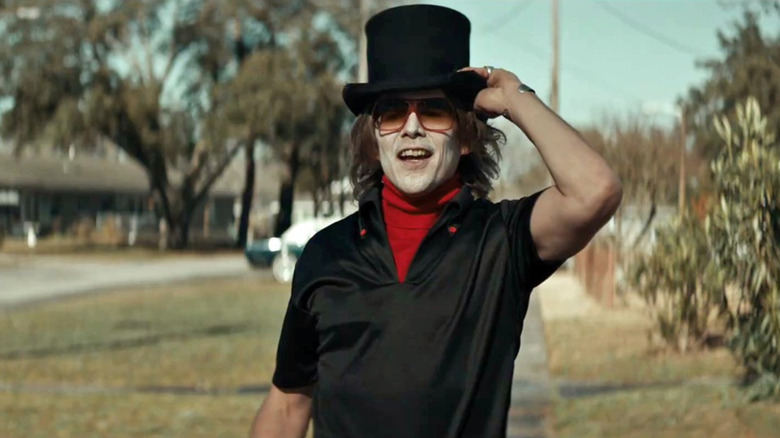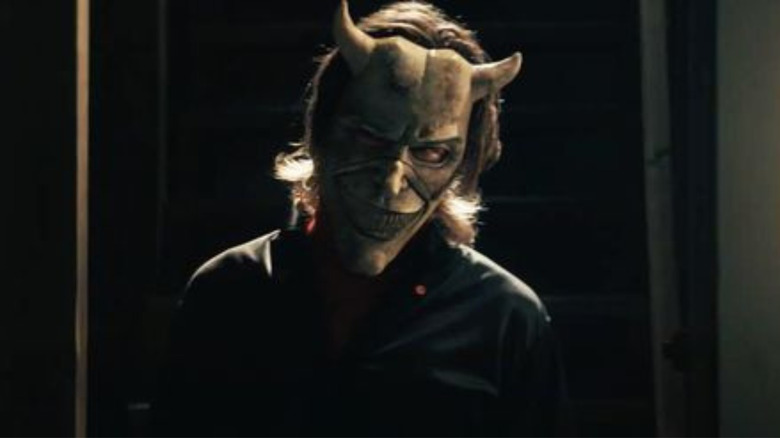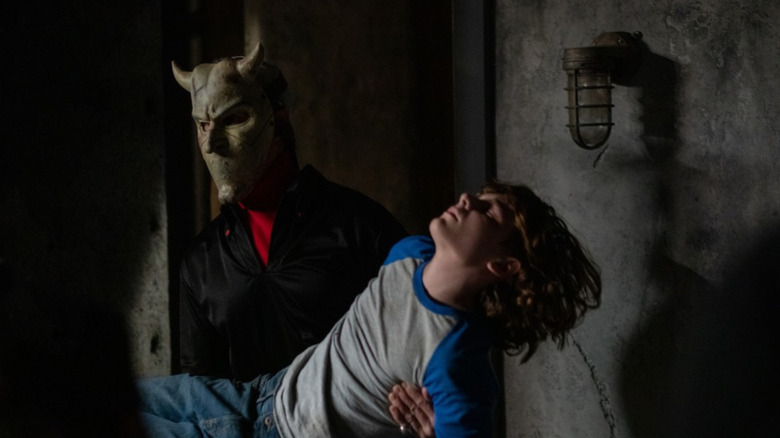The Real Historical Inspirations Behind The Grabber's Mask In The Black Phone
Those who have already read Joe Hill's 2004 short story "The Black Phone" might have noticed that its new adaptation has made a major change to the source material. Instead of the sinister Grabber (Ethan Hawke) being a clown like he was in the original, he is now a magician, sporting a top hat in public and looking like someone you'd want to avoid at all costs.
This is doubly so if you're like Finney (Mason Thames), who gets kidnapped by the Grabber and locked away in his basement, his only lifeline being a disconnected telephone that somehow let's him speak with the dead. When all alone and not in public, the Grabber sports a series of downright creepy masks adorned with horns that make him look like a walking devil.
According to Hill and "The Black Phone" screenwriter C. Robert Cargill, this was by design. In interviews with /Film, the writers discussed the real-life inspirations behind the changes made to the Grabber, particularly those terrifying masks.
I'm a part-time magician
When talking to /Film, both Hill and Cargill admitted that the former's father, the illustrious Stephen King, had an influence on the Grabber's change in occupation. Hill explained:
"As a kid, I read 'It' when I was 12, 13. It blew my f****** mind. I just absolutely loved 'It,' and I loved the TV movie."
It shouldn't be surprising that Pennywise had an unconscious effect on how Hill originally wrote the Grabber. However, the fact that he was a clown presented a small problem for the "Black Phone" crew, as the story that Hill fell in love with was experiencing a major resurgence in popularity:
"Flash forward to now, and [director Scott Derrickson] and Cargill were talking about making the film, and one of the things we all talked about was what are we going to do about this aspect of it? Because 'It Chapter One' just came out, and America has only so much space in its heart for evil clowns. And so we hit upon him being a part-time magician instead."
While this might sound like a major departure from the source material, it didn't actually end up changing a whole lot. In a separate interview with /Film, Cargill said that the team was enthusiastic about this new change.
"[Changing the Grabber's occupation] was something that [Hill] recommended," Cargill explained. "We said, 'Yeah, we're fine changing it from a clown. We're not married to the clown aspect, but what do we replace it with?'"
The magician from Hell
With the change from clown to magician secured, Hill found inspiration in a lingering fascination he had regarding old-school magicians. Many from the 1920s through 1940s, including Howard Thurston to Dante the Magician, incorporated devil imagery in their acts by playing both a treacherous demon and the hero who defeated the devil using magic. As Hill explained to /Film:
"We looked to the history of magicians fighting devils. So that was a whole thing in like 1920s, 1930s stage magic, was the magician himself would appear as a devil and do some sinister sorcery, and then he'd slip behind the curtain and come back out with his mask off and do heroic magic, and that was a whole thing."
Why not take this one step further? Cargill recalled how Hill pitched the devil magician approach:
"He goes, 'Well, I've always been kind of obsessed with these '30s and '40's magicians who would do a magician act that was half magician and then half devil. And they would go back and forth between these characters.' And we said, 'Well, that's rad. Let's do that.'"
A sadder truth
While demon-fighting magicians were the primary inspiration for the Grabber's change, there is a more terrifying and tragic reason for the alteration. The horrific crimes of infamous serial killer John Wayne Gacy inspired Hill when he first wrote "The Black Phone" in 2004, and his influence still lingers in the film.
From 1972 to 1978, Gacy killed 33 young men, ranging from 14 to around 30 years old. Outside of his tragically high number of victims, the case against the serial killer is defined mostly by his house's crawl space, which housed the majority of his victims' bodies, and his volunteer gig as Pogo the Clown. While Hawke previously said he did not use any real-life killers to inspire his performance, Hill explained that Gacy was the inspiration behind his original Grabber:
"I was thinking about a certain kind of child killer [when writing "The Black Phone"], and the child killer that came to mind was John Wayne Gacy, who was in fact a part-time clown. And so that's kind of what I modeled the serial killer on in the story."
Overall, forgoing the clown aspect of "The Black Phone" appears to be the right call. For starters, drawing inspiration from old magic acts resulted in giving us an arresting horror villain in the Grabber. Seriously, what other horror villain looks like him? On a more serious note, it allows more separation between the Grabber and the all-too-real crimes of the killer that inspired his creation.



